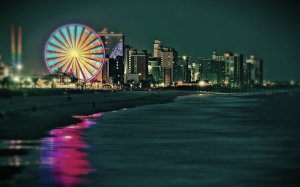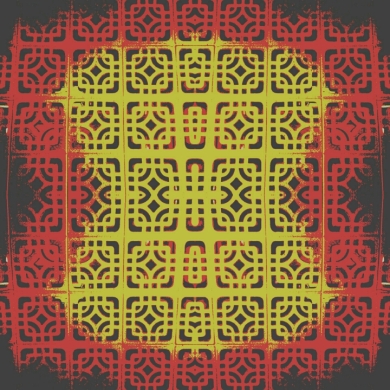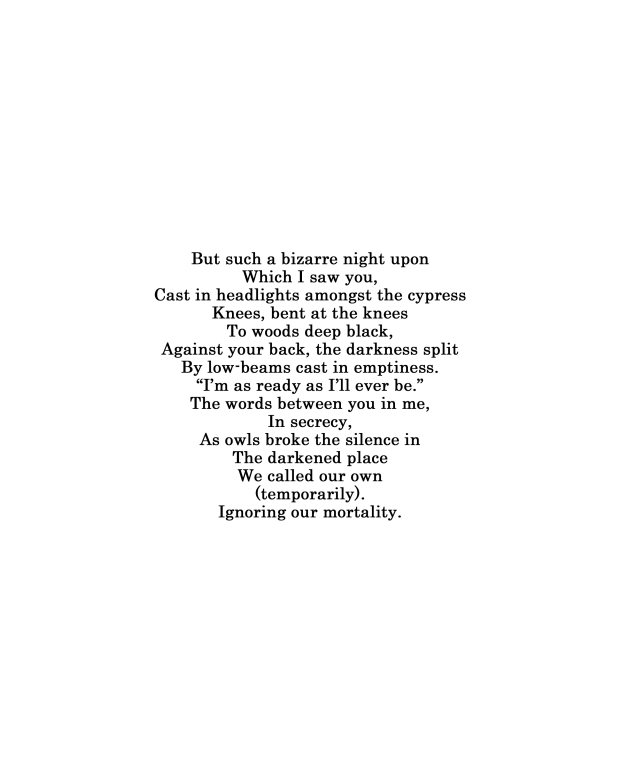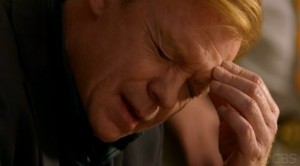—–
Somewhere out in space, a satellite with a brightly colored “Quik-Mart” logo was beaming music at the speed of sound to the otherwise sterile, standard gas station. It was stocked with the same appallingly unchanging list of goods and products: salted peanuts, variously flavored potato chips, overpriced batteries and loaves of bread. Beverages ranged in four categories: syrup, juice/dairy, booze, and water. Predetermined songs found their way through an array of speakers in the drop-ceiling, showering the inside with sounds that had been deemed appropriate for “quik” customers.
A fine, drizzling mist had descended, coating the tall windows and blurring the three-word advertisements for coffee and honey buns and beer that populated the glass.
David was alone in the parking lot, except for the waterlogged car that must’ve belonged to the clerk inside. He sat behind the wheel of the beat-up sportster, watching the wipers streak back and forth. Though the fight wasn’t for another three hours, each mechanical swipe across the windshield ate up minutes by the handful. They passed by in droves under the unforgiving green-glow of the dashboard clock.
After an infinite span of drizzle, David opened the door, sloshed across the oily puddles in the lot, and went inside. The door chimed. The clerk didn’t bother to look up. She was fat and greasy looking, hair in a grotesque pink scrunchie, and perched dangerously atop a wooden stool. She stared aimlessly into the pages of what appeared to be a fashion magazine. Stray bits of hair that had escaped the scrunchie’s death grip obscured most of her face. The dumb satellite music serenaded the interior with sounds from over a decade ago. Electric guitars and sharp treble.
“Miss?” David said. She didn’t answer, licked her finger lazily, and flipped a glossy page. “Nevermind,” he mumbled, catching sight of the large arrow pointing toward “Rest Rooms.” His wet shoes squeaked across the polished floors. The two doors in the hallway were labeled poorly in what appeared to be black, permanent marker. MARS was at the far end, just past VENUS.
He closed and bolted the door to the more distant planet behind him. A stained sink, weary looking commode, and scratched up mirror were installed ingloriously, having weathered god-knows how many years of excrement, filth, and sick. Despite the acrid smell of piss-covered floor tiles, David was alone. Not in the buzz of traffic or the noisy thick of the run-down apartment. Not tending to his mother’s sadness. Not being ordered about at a stupid day-job, bossed by various managers. Not knocking out another young punk in the ring. It was just him. In the past thirteen years, this had become a rarity. Even the goofy, uninspired satellite music didn’t penetrate the door to Mars. Only white, empty walls and the quiet hum of florescent lights.
He relieved himself, not bothering to touch the questionable flusher handle, and turned to the mirror. His reflection—the room’s other occupant—stared back at him curiously from a parallel bathroom behind the glass.
Nearly thirteen years ago, he had stopped at this same store for the same reason he had stopped this night. He had stared at himself in the same mirror and looked upon the same face. Only then, the face was younger, brighter. It had been filled with a different type of resolve. It had been one filled with more ambition…with more hope. It was a face that looked less angry and more confident. That looked less tired and more fierce. A face who’s nose hadn’t yet been smashed to bits. More than anything, it had been a face that never anticipated seeing itself—gray and harsh—considering thirteen years of time gone by. Had never anticipated a future in which the exact same moment that had brought it there, then, had brought it back, staring at itself, now.
“Look at you,” David said to the man. To the other him. “What do you intend to prove, huh? After all this time? What can you do now that you couldn’t do then? Take him down? Bring down the big-guy? Take the gold and make everything right again? Win the fight everybody bet on you for?”
He shook his head, sending a few stray drops of the drizzle from outside splattering against the scratched glass. His hands were rough and calloused from years of labor. Years of fighting. His knuckles were red and hard, having gone from the fists of a fighter to fists that tiredly clutched harsh metal tools—hammers and cutters and electric drills, lumber and stacks of shingles—and finally, had decided to fight again. They had endured the slow grinding down of flesh and will, transforming as they were needed, clawing their way through the years gone by. Doing what had to be done.
His hard fingers twisted the “cold” knob on the sink, sending a stream of sulphur-smelling water spiraling down the drain.
Thirteen years ago he had looked back up, set his jaw, and said the name aloud.
“Titus Grant.” The bookies had made sure that David would fight him. He was the champion. He was strong, powerful, dangerous. He was twice David’s size, too. Back then, underground fights were not like they had become. There were no regulations on weight class or on skill. Things hadn’t been as hush-hush either, even for “underground” fighting. Things were supposed to have been easier, then. It had all been a gamble. But David was one of the fastest and toughest, if not the biggest. He was confident. Kay and Daisy were confident. He was ready, or so he had thought long ago, before “The Giant” smashed the majority of his ribs, broke his nose, shattered his collarbone, displaced three vertebrae, and ended his career. There had been no way of knowing, though, and his younger self had walked coolly from the inside of MARS back to the counter and asked the clerk for a pack of Newports.
Until after that night, David had attributed his luck to a private tradition: buy a pack, smoke one in the hour before the fight, and throw the rest away. Daisy’s cigarette habit had worn off on him, it seemed. A lot about Daisy had affected him and his mother of the years.
Now, the foul smelling water bubbled sickeningly down the aged sink, disappearing into some unseeable pit of waste. He thought of Daisy and her cigarettes being washed down the black hole and through the dirty p-trap and out to a septic sea, sploshing out of the slimy, crusted end of a huge drain pipe. He dismissed the thought, looking back into the mirror.
“Can you do it?” He said quietly, barely audible over the gurgling water. “Can you take him down?” His dark eyes searched themselves. Over a decade of suffering flashed beneath his pupils, narrowed by the harsh white light. “You’re damn skippy.” He said.
At the counter, the clerk looked up slowly from her magazine, resembling a cow studying an approaching farmer. She hadn’t attempted to say anything before, so David spoke without waiting.
“Pack of Newports,” he said. “Short ones, soft pack, please.” He said.
The girl grabbed a pack from the overhead rack with a grubby, pale hand and flopped it between the two of them.
“I know you,” she said, pressing a few buttons.
“Yeah?” David said, not bothering to sound too interested, and opened his wallet.
“Yeah,” she said defiantly. “You’re a fighter. I saw you get beat up when I was little.”
“Hate you saw that,” David said in a low voice, fumbling for a ten. “I don’t remember it.”
“Yeah, well I do.” She said. “It was bad. You got the shit beat outta you. You still fight?” She added, looking up from her greasy hair. David met her gaze. Her eyes were dark brown and reflected back the overall glow of the station.
“I didn’t,” he said. “But I had a lot of healing to do.”
“I bet,” she said. “So are you going back? To fight again, I mean.” She punched some numbers and made change for the ten without looking.
“Yes,” David said, unsure of his own voice. He said it again to hear it. “Yes, I am. Tonight.”
“No shit,” said the girl in mock amazement. “Better wear a helmet, Boxer.” She smiled, revealing the dimples of a second chin and amazingly white, straight teeth. “Who ya fighting?” She added casually, dropping the ten into the drawer and closing it with a click.
“Another old guy,” David said and, surprising himself, let out a little laugh.
“You don’t look that old,” the girl said, looking back down at the magazine. “I was wondering what his name was. I know you’re David ‘The Lightning’ Wymond. I read it in a magazine.” Her dimples were both endearing and repulsive. Familiar.
David laughed again, ignoring the folds of her neck. “Yeah that’s me. Or, was. I’m probably pretty slow compared to then.”
The girl looked back up, blue eyes scanning him. “You don’t look slow to me. I bet you can take on whoever it is.” She nodded, as if confirming the belief for both of them. “Who is it?” She said.
Just a man. David thought.
“Titus Grant.” He said. His smile disappeared. Turning, he squeaked across the sterile tiles, tucking the Newports into his pocket, and slipped away darkly into the persistent mist.
Behind him, the fashion magazine fell flatly to the floor.
—–
“Alright, here’s the deal,” Daisy said in a half-whisper, pausing to light a long white cigarette with a noisy clink from her Zippo. David and Kay leaned in close.
“It’s a bit of a haul,” Daisy continued, “and even more, its a big chance. But we all know that David is an excellent fighter. Right, David?”
He squeezed his eyes shut for a moment, reopening them slowly as his cheeks flushed red. She had a knack for being obscenely flattering. It was something he had noticed over the course of her friendship with his mother.
“I, uh….well–” he began, but Kay cut him off.
“Of course he is!” She said loudly. A few patrons at the bar glanced over their shoulders from their stools. David rolled his eyes. Get to the point, he thought.
“Hush, hush!” Daisy hissed in a not-so-whispering sound. “Of course he is,” she said confidently.
David held up a finger, and opened his mouth to speak.
“Just listen, Davey,” Daisy interrupted.
“Don’t call me that,” he muttered. Daisy heaved an overly dramatic sigh. The patrons at the bar turned back around in favor of a baseball game on a large television.
“David,” she said sarcastically. “We all know you’re one of the best. You’ve gone through nearly fifteen fights in the past couple years and won every single one of them except one.”
She was right, of course. It was only after the first three fights that the underground clubs bestowed him with his nickname.
“I mean,” Daisy said, batting her eyes emphatically, “they don’t call you The Lightning for nothing. Of the fourteen fights you’ve won, you won nearly every one of them within the first round. And the one you lost was only because you had that cold.”
Kay nodded. “You shouldn’t have gone. He nearly killed you, that guy.” She said in a worrisome tone that only his mother could genuinely achieve. If Daisy had a knack for flattery, his mother had a knack for guilt.
“He didn’t come close,” David said flatly. “I pretty much let him win.” There at the bar, David had not yet known the level of defeat the future would bring. At that point, his only loss was barely a scratch against his record.
“Yeah, well tell that to the bookies.” Daisy said matter-of-factly.
“Daisy!” Kay said, hushed. David raised an eyebrow.
“Bookies?” He said, looking Daisy square in her bright, dancing eyes. She seemed halfway between thrilled and terrified.
Daisy shook her head, looking down at the table. Her long, painted nails rapped back and forth, from pinky to index finger. Behind them, the resounding crack of a baseball bat set several of the more enthusiastic patrons into a drunken cheer. Daisy looked back up, realizing that David had not broken eye contact.
“Yes,” she said. “Bookies.” Kay drew in a sharp breath. Turning his head slowly toward his mother, the understanding sunk in. He looked to her, but she averted her eyes. “Now, David–” Daisy began.
“No, no,” David said, shaking his head. “Mom, were you in on this?” His voice departed from the whisper they had maintained, but the patrons were still celebrating the last batter and failed to overhear.
“I didn’t support it, David. You should know that. I was perfectly content with the winnings from the managers.” She lingered for a moment, then made to speak again, but Daisy cut in.
“David, it was my idea,” she said calmly, negotiating. “Your Mom was entirely against it. Well she was, until I pulled it off for us. It was only a small wager, anyway.” She smiled broadly, spreading both her palms. How she shifted between looking like a teenager and a casino-gambling shark had always amazed David. Something about those dimples and those gallantly parading eyes.
“Pulled it off?” David said, looking back into Daisy’s glowing smile, her rosy, Shirley Temple cheeks.
“I got us double what the managers would have doled out.” She said boldly, straightening her shoulders and lifting her chin. Her eyes positively celebrated. “Without it we wouldn’t have managed the bills that Christmas.”
“You mean the year we took you on as a house-mate?” David said sharply, continuing before Daisy could reply. “I thought you said you got a bonus for the holiday, anyway.” He said, turning his attention back to his mother.
“Well,” Kay said innocently. “I lied. I had to do something or we would’ve been out on our ass. They never gave anybody bonuses at that plant, anyhow. Bastards. Had it not been for Dais—”
“Mom,” David said stonily. “Mom that’s not fair. You can’t use me like–” he paused, his eyes becoming distant. His forehead scrunched into a series of grave lines. “Was it only once?” He said, hushing his voice. Daisy made a tiny noise, and David flashed a dangerous look at her.
“It was supposed to be,” Kay said, her eyes beaming rays of desperation. “Which is why we brought you here to talk.”
David fixed his sights back on Daisy, who deflated as he spoke.
“You bet on me when I was sick, didn’t you?” He said loudly. A loud crack of a baseball bat initiated another round of cheers behind him. “Didn’t you, Daisy? That’s why we’re in shit-stew again. Is that it?”
She squirmed in her seat like a worm on a fish-hook. Her dimples appeared to be writhing.
“I finalized the gamble with the bookies before you ever got sick, David. You have to know that. They wouldn’t let me back out or even reduce the stakes. We had already been matched by the others betting on your competition. It was the least I could do to hold the table. One of them caught wind you were ill and wanted to push us out of the entire bet. We’d have lost the whole investment. It took everything to get them to stay. David,” Daisy sighed in a drawn, tired voice. She sounded like a beggar. “You have to understand. The chance we’re taking…what’s at stake? You have to realize the position we’re in.” Her eyes sparkled and shone. Bitch, David thought. Whore.
He looked down. The amber bubbles of his beer collected in tiny clusters and popped quietly along the edges of his glass. Daisy had been so kind as to buy him a drink, but didn’t bother to get herself one. She had quit drinking the past few weeks. “Don’t wanna ruin my figure,” she had chided, when David called her “lame.” She had seemed excited and anxious as they waited on Kay to arrive.
“I know the position we’re in,” David said dully, not bothering to look up. “We’re flat broke. And now I know why. Because of that fight. My last fight. You and Mom gambled behind my back and now we’re all in deep shit. All because I wasn’t “The Lightning” you were counting on. A dumb gamble.”
“David, please.” Kay said reassuringly. “It wasn’t your fault. In all fairness you wore the boy out. Six rounds with a cold? You’re better than lightning, son.” David snapped his attention back to his Mother.
“Don’t patronize me, Mom. You should have said something. You should have given me some idea what was at stake.” His voice was like stone. Unflinching.
“Why do you think we’re here?” Daisy interrupted softly. “Hm? Because there’s a chance to solve all of this. And we already knew none of it was fair, so this time we’re laying out the stakes for you. Take it or leave it, David, but this is our best chance of getting out of this mess and getting our shit back in order. You’re not sick this time and you won’t be.”
“How do you know that, huh? Like you did last time?”
“No, no,” Daisy said, laughing in a way befitting a harpie. David imagined her with scales instead of skin. He thought of dark, bat-like wings growing from her back. She continued in confidence. “Because the fight’s in two days. And because we’ve scouted your competition. And because we have just enough money left to make the drive there. And because we bought you a box of alka-seltzer and vitamin C. Gotta think ahead, you know.” She grinned, revealing her perfect white teeth, her little-girl-dimples. That smile that beguiled and enticed. The same one that had won Kay over those years ago.
“Daisy,” David said. “You make it sound like I have a choice.”
“Of course you have a choice,” said Kay. “I can always go back to work at the plant. We can find you a full-time job. I can make some calls. There’s always an option.”
David looked down into his beer, listening to the announcers champion the ball-players on the big TV behind him. His eyes scanned the rough grain of the round table, taking in the delicate tapping of Daisy’s nails, the antsy shifting of his mother on the hard, wooden chair. Imagining those sickly dimples.
“You’re not going back to that plant,” he said finally, not bothering to look up. “I won’t have it. If you got hurt they wouldn’t give a shit.” He said. “So if that’s my option its no option at all.”
He took a sip of drink quietly. No one spoke for several minutes. One of the patrons behind them let out a grotesque sigh as the announcer deemed an unlucky runner as “OUTTA HERE!”. Finally he looked up, first to his mother, who’s face was contorted in a grotesque pause, then to Daisy, who’s eyes flickered like candles. Like a kid in a candy store, he thought.
“What’s the gain?” He said in a monotone. Daisy answered without hesitation.
“Four times what we’re used to.” A knot cinched itself neatly into David’s stomach.
“Four?” He mouthed.
“Four.” Daisy said like a judge. Kay remained silent, watching her son and her best friend.
“Just imagine how much we could fix. How much we could–” she said, but David already knew. He saw the greedy look in her absurdly bright eyes. Only one other question came to his mind.
“Who’s the guy?” He said. Daisy quit clicking her nails and leaned forward so close she could’ve taken a sip of his drink.
“You’re the challenger,” she said. “Which makes you winning extremely valuable. This guy is undefeated locally, and has a lot of supporters. A lot with money. He’s big, he’s strong, but he’s slow as dirt. The guys in my circle know you’ve got speed on him by at least twice as much. We could walk away champions, and never go back.” She said.
“The guy.” David demanded, sliding his drink closer to his chest, wondering just how many “guys in her circle” there were. Considering how skin-deep her beauty might have been. Whore, he thought again.
“He’s down by the coast. Part of the underground circuit there. They call him The Giant. Heard of him?”
“Titus?” David said. “Titus Grant?”
“That’s him,” Daisy said. “You can beat him, can’t you?” She smiled her charming, harpie smile.
“Like a steak before dinner,” David said, grinning.
“I’m counting on it,” Daisy said, leaning back. “We leave tomorrow.”
“Where on the coast?” said David.
“The Pavilion,” Kay answered. “It should be a lot of fun. I know a cheap place we can stay. Daisy helped me find it. She used to vacation near there when she was a girl. I’m glad you’re okay with this, Son.”
David took another sip of beer. He wasn’t sure just how “okay with it” he might be. The sweet lager washed over his tongue, sweet and grainy and cold.
“Did you already place the bet?” David asked, looking deeply into Daisy’s eyes, which were absolutely ablaze at this point. He knew she had. He could tell.
This is my plan, those parading eyeballs answered, boasting. “What can I say?” She cooed in a half-laugh, half-mocking seriousness. “I took a gamble.”
David laughed, and swallowed down the last few sips of drink in one gulp.
Behind them, the baseball game played on, with the opposing team finally up for bat.
—–






